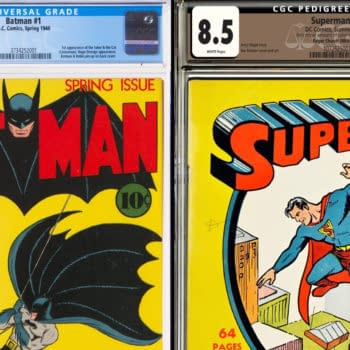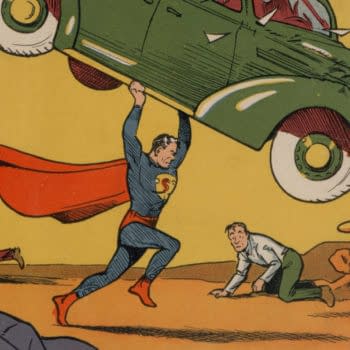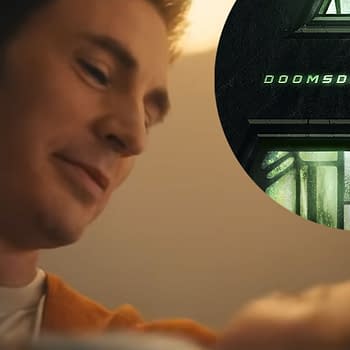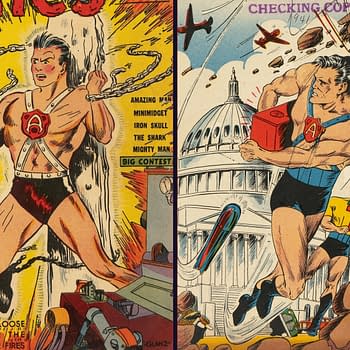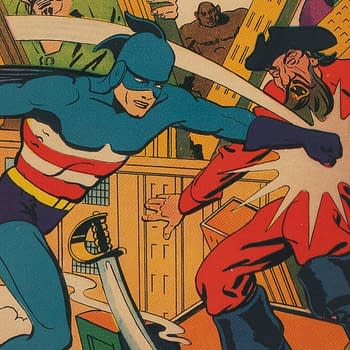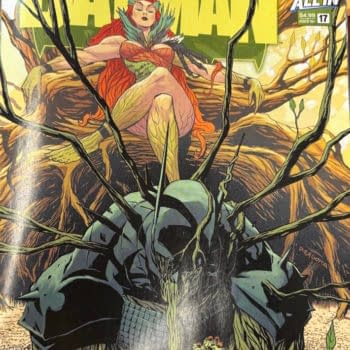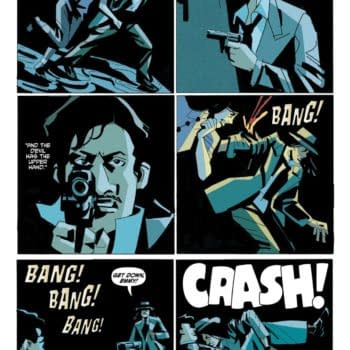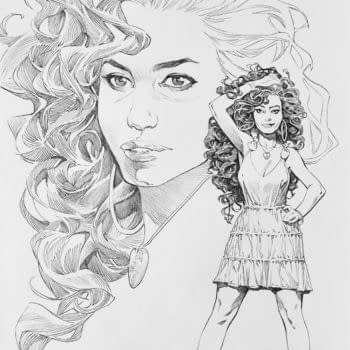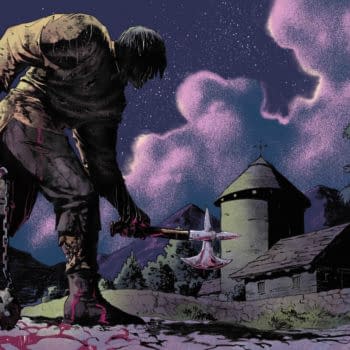Posted in: Comics | Tagged: Brian Posehn, cullen bunn, daniel way, eccc, Gerry Duggan, Jeanine Schaefer, mark waid, marvel, matt fraction, sam humphries
Marvel ECCC: The Spreadsheets That Track The Marvel Universe And Continuity Is The Devil

I find editor Jeanine Schaefer's comment about tracking Wolverine's life with charts, spreadsheets, and timelines interesting, because I think we all wonder how the big-universe publishers do that and it's always nice to hear a tidbit. Spreadsheets run the world more than people realize (though sometimes with very unintended results), so it's fun to see that the Marvel U is maybe no exception to this.
And moments later, according to Dustin's write-up, Matt Fraction provided a little contrast to that with his "Continuity is the Devil" comments — completing a nifty (and appropriate, I'd say) little snapshot of the editor's perspective vs the writer's perspective on that particular brand of the devil's details.
Dustin Hall writes:
At this weekend's Emerald City Comic Convention, Marvel fans were offered a rare chance to question and converse with a few of their favorite creative minds from the legendary Bullpen. With the bonus, they were quick to point out, that not one Marvel PR rep was there to hush them abruptly.
While the panel was surprisingly free from story revelations, it did offer a rare, candid look at the creative process for these shapers of worlds.
Panelists included Editors Sana Amanat (Nova, Guardians of the Galaxy), and Jeanine Schaefer (X-books), and creators Daniel Way (Thunderbolts), Mark Waid (Daredevil, Hulk), Sam Humphries (Uncanny X-Force), Matt Fraction (Fantastic Four, FF), Cullen Bunn (Venom), and the team of Gerry Duggan & Brian Posehn (Deadpool).
*answers paraphrased for length.
Q: How do you portray heroism in your books?
Way: That's difficult to define. I write for entertainment, for relief. That's such a large concept, its hard to define how I would even show that. I guess by contrast. I know what heroism is not, so I begin there, and have my hero work against that.
Humphries: My grandma used to say "Don't ask for challenges equal to your strength, ask for strength equal to your challenges." I guess it would be rising up to something, even if its not something we would normally do. I thought about that when I wrote the President Cap story in Ultimates.
Waid: A character has to make interesting choices. I think Spider-man is the best example of that, the dichotomy. If he does something that is expected of him, like saving people from a fire, its not a big deal. Until, that is, it comes at a cost to Peter Parker. There's never a clear victory for him, so his choice is difficult for most people. It makes him heroic in that.
Fraction: The question is… I'm not sure I understand it. Not to be obtuse but that's so big. Every character has their own way of doing something, whether we think its heroic or not. I suppose in that they are a hero because they do what they think is the right thing. If we agree with them, then ok.
Bunn: I agree with that. The definition is shaped by the character. Heroism is shaped by who they are and what is around them at the time.
Q: Can you guys just be nice to Spider-man for a change?
Schaeffer: I don't know about being nice to him, but he does have some amazing moments. I think my favorite of late was him in AvX when he stood against the Phoenix. Its not about Spidey getting beat up, its about him falling and refusing to stay down. That's what defines him and makes him a hero.
Fraction: I think what you're asking for is a Spider-man story where nothing happens.
Way: Maybe at the end of the story, he could put on a jacket he hasn't worn in a long time, and there will be a 5-dollar bill in the pocket. That would be a good day.
Q: With digital comics sales up, and female readership up, are you using any new strategies to capture new, especially minority, readers?
Amanat: It is tough. We try to write books that are accessible, open to new readers, but also familiar and evolving for existing ones. When you write, you do it from your own perspective, but also in a way that appeals to the target audience. The community still needs to be able to rally behind that creation, and support it and help spread it to it can grow beyond the limits of our own outreach.
Fraction: We're at a moment where we are breaking the perceived wisdom of decades past where comics where just created for white males. I think everyone is just discovering that its the tip of the iceberg Things have changed so much, even in just the last 3 or 4 years. We are at a moment of huge change, and yeah, digital comics will be big in increasing that accessibility.
Way: At Marvel, we have to write for a broad market, but also put enough hooks in to catch specific niches or specialty markets. Digital will allow for wider spread. Its a leveling of the playing field.
Waid: We need digital comics because there are whole areas of this country that aren't anywhere near a comic shop. But they have phones, they have ipads. Digital is the new newsrack spinner.
Way: And it is also helping to grow the sales of trades. If we work at it, we can convert digital interest into monetized sales.
Humphries: Companies that don't offer digital product, don't use that accessibility, they will fall behind.
Q; With characters like Wolverine popping up in multitudes of titles, how do you keep track of him? How do creators communicate?
Jeanine: There's a chart! There are a lot of spreadsheets, and his whole life is charted and dated on a timeline in editorial. We help keep track of that.
Way: I know that I don't worry much about him being in the same place as the other issues, so long as he is the same character.
Fraction: Consistency over continuity. Continuity is the devil. Its all just trivia. You read in one comic he doesn't like ham sandwiches, and in another he does. Who cares? That's just trivia, and doesn't matter to the character overall. Time isn't really time in comics, so we can't worry about why he's here in one book, there in another. Or else I would be wondering why Franklin is still 8 and Julie Powers is in college. Its just trivia, and alienating to new readers.
Bunn: Its a shared world, yes, but obsessive detailing becomes difficult to write within. The story is more important.
Posehn: On that note, we would like to announce that we are writing a new book called Wolverine vs Ham Sandwiches.
Q:Are there any unique challenges to writing a character like Deadpool?
Way: Most characters have a strict definition, but Deadpool's definition is a scramble. You can project onto him, and can do almost anything. If anything, he is an exercise in restraint to keep from going too far. It's kind of freeing. With a lot of characters, you have to work to relate to them and it can trap you.
Waid: I disagree with that last bit. I think you can find something in yourself to apply to almost any character. I didn't know what to do with the Hulk until I drilled down into him. Or Thor. I couldn't find a voice for Thor at first until I realized his relationship with Odin. Thor is a son who can never please his father.
Duggan: … and that's how we write Deadpool.
Q: To what do you attribute the rise in strong female characters of the last few years? (And thank you!)
Fraction: Well, it goes along with what we were saying before about finding new readers out there. But also, as a father, I realized I was going to have to answer to my daughter one day for working in an industry that is not historically great with women. … I wanted to have characters that she could dress like for Halloween. And that cosplayers didn't have to shave their legs to be.
Q: Have any of you wanted to adapt any of your characters into a novel?
Fraction: Maybe Deadpool could do a version of ""What to Expect when you're Expecting""?
Posehn: What's a novel?
Q: Before we go, can we get a teaser of what's coming up in Hawkeye?
Fraction: Sure. In issue 9, you will see issue 8, but from the perspective of the female characters, and issue 10 from a killer's perspective. Issue 11 puts Hawkeye into a traditional whodunnit murder mystery, and 12 sees his brother move in with him, for better or worse.
The one I'm really excited for is the sign-language issue we have coming up, where Hawkeye is deafened again, and he and his brother have to rely on the sign-language they used in their youth to communicate and survive.
Thanks to all the Marvel panelists for sharing their insights!




